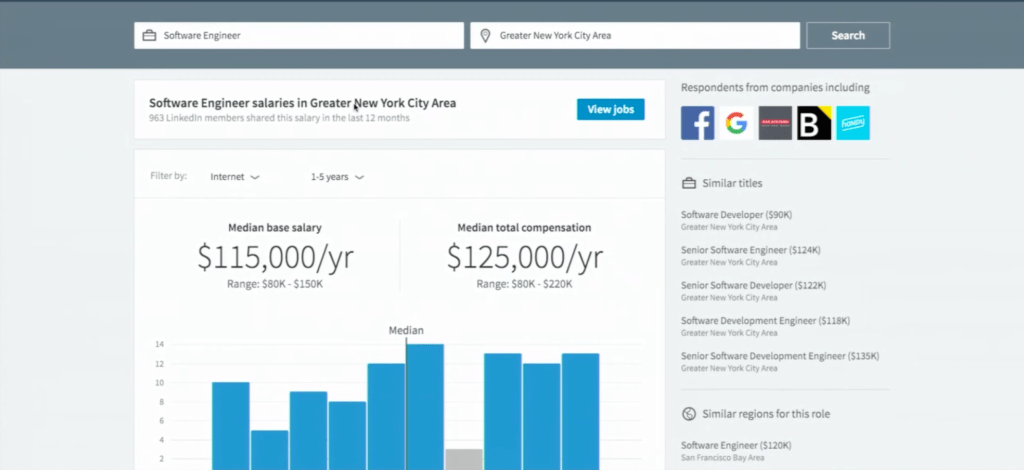LinkedIn — the professionally-oriented social networking platform that’s being acquired by Microsoft for $26.2 billion — has made a play to build what it refers to as “the economic graph“, a concept that combines your profile with LinkedIn’s own analytics and data trove to chart the connections between you, your career, your industry and the wider economy. Today, it’s launching a new product that fits in squarely with that strategy.
LinkedIn Salary, a new portal and tracker to collect and analyse salaries globally, will let users find how much a particular job earns (salary, bonus, and equity data), with the ability to drill down using parameters like years of experience, location, and education level.
Much of what LinkedIn has been doing on the product front recently has been about functionality that enhances how LinkedIn already works (see: this Endorsements update; or this secret signal it created to let people know you’re looking for a job). LinkedIn Salary is that, too, but it’s also a progression into a new area of data collection and analytics for the company.
LinkedIn Salary, first and foremost, will be fuelled by LinkedIn members information. To access the Salary portal, you have to supply your own salary data, which LinkedIn says then gets anonymised and crunched into is bigger data trove. The exception to this are Premium users, who can bypass providing their salary data to access the service.
Dan Shapero, the Careers product manager, told me that Salary is already populated with salary data from some 1 million members from the U.S., Canada and the UK — LinkedIn’s been quietly asking users for their pay details as it prepared for this launch. (Quiet, but still noticed by some, it seems.)
There are already a number of places where you can look online for salary information, from government bodies like the U.S. Bureau of Labor Statistics through to periodic surveys and other sites that already collect salary info. These include a popular salary tracker from Glassdoor (LinkedIn is already trying to compete with also on company profile pages), newer services from Comparably, and older platforms like PayScale.
PayScale, in fact, once inked a deal with LinkedIn to provide a salary tracking service. LinkedIn has confirmed that PayScale is not working with it on this new Salary portal, but to confuse things, you can still use the old PayScale/LinkedIn integration, which sits on PayScale’s site. That might be one reason why LinkedIn has decided to build and launch its own salary tracker: it can then own that data for itself, and control how it presents and uses it.
Shapero says that LinkedIn launched Salary because the company believes that there is nothing that offers the kind of detail that LinkedIn is aiming to provide: “There just isn’t a global salary for software engineer,” he said, “not even for one in New York City. The salary varies too much, so understanding what you can do to put yourself in a position to earn more is important.”
Lest you think you can get away with putting in a random number if you want to visit the Salary pages but don’t want to give up your information (or pay up for Premium membership), think again. Shapero said that there are machine learning tools in place to detect when you’ve put in an “off” figure. Over time, he said, there may be other sources of data that LinkedIn adds in to complement what its users provide, to help triangulate things.
LinkedIn Salary, in a way, plays to what LinkedIn does best: the company, which has 476 million registered users by last count, is known as one of the first ports of call for people who are on the hunt for new jobs or might just be making sure that their windows are dressed nicely in case a recruiter comes calling (it’s association with recruitment, in fact, sometimes works to LinkedI’s detriment, such as when it has tried to push completely new and not ancillary products like its news service).
In other words, the Salary tool is a natural complement to how people already use LinkedIn: if people are looking for work, or might be getting approached for work, it’s natural to want to know what the size of remuneration might be.
Apart from what LinkedIn may be already offering to users today, what’s noteworthy is how LinkedIn might use Salary to hook in other services in the future. For now, LinkedIn already presents related jobs through the portal, but it could enhance this to a full-out job search in the future.
This is also very obvious place to place some of its new educational tools, which fit in with the larger concept that more experience and qualifications might help you earn more in a role.
Shapero also told me that LinkedIn has charted a 200% increase in job searches in the last year: a sign of how there is a demand right now for the kind of data that Salary hopes to provide. And there are plans for more related products to come, he hinted. “You are going to see step change in the category, and the way that we position LinkedIn as a place to advance your career.”































Comment